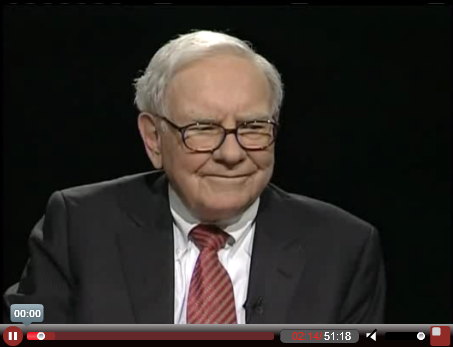Business Insider was kind enough to publish an excerpt of my new book yesterday and it prompted some questions via email and the forum.
The article is myth #1 in the investment myths chapter of the book and discusses how hard it is to replicate what Warren Buffett has built. In essence, I argue that Buffett actually runs a multi-strategy hedge fund at Berkshire and that replicating what he does is nearly impossible for the average investor.
Some questions arose so let’s see if I can clear the air:
David writes via email:
“Cullen, I read your BI article with interest. But I had a quibble. You said that Buffett’s purchases of American Express and Geico were distressed debt plays and not value investing. I don’t agree. I think Buffett buys great businesses at a great price. That is his strategy in a nutshell. Whether the firm is in distress doesn’t matter or not. Can you clarify your thought?”
CR: I think most people view “value investing” as using basic valuation metrics to purchase what they perceive as cheap companies relative to their intrinsic value. Distressed debt strategies and value investing have many similarities, but I would argue that the average distressed debt strategist is engaging in something far more complex than simply looking at P/E ratios or looking for “wide moats”. I think that what Buffett engages in is often far more sophisticated than the way it is described. In fact, I think Buffett’s approach is often dumbed down in a manner that is dangerously misleading. There are over 2,000 mutual funds implementing some form of “value” approach. Not one of them resembles Berkshire Hathaway even remotely. And there are countless retail investors using what they think are “cheap” valuation metrics to buy what they perceive as “value” stocks….I just don’t think this really resembles what much of Buffett does except in a very loose way.
Trevor comments in the forum:
“Do you think the massive size of Berkshire prevents bets today of material impact as compared to those in the long past?”
CR: Ironically, I think that Buffett has become famous at a time when his firm likely can’t outperform the market by much. And so you get a lot of investors who have bought into his past success assuming that the past performance is indicative of future returns. But we’ve seen a clear diminishing rate of return as Berkshire has gotten larger. Which is totally expected. When you grow to become a $300B firm you inevitably become such a large component of the market that you become highly correlated to the market. So yes, I do think that Berkshire’s size is an impediment to its future potential returns. The firm simply doesn’t have the same flexibility that it once did. Which is fine. But don’t go into Berkshire thinking that you’re buying some small cap growth firm or worse, that you’re buying a large cap firm with small cap growth.
Mike comments in the forum:
“Cullen – you write that the “Buffett Partnership charged 25 percent of profits exceeding 6 percent in the fund. This is a big part of how Buffett grew his wealth so quickly. He was running a hedge fund no different than today’s funds.”
NO different than today’s funds? How many hedge funds today charge ZERO AUM and don’t take profits until returns exceed 6 percent?”
CR: Yes, Buffett’s fee structure was definitely more client friendly than your average 2 & 20 fund. There’s no doubt about that. But that doesn’t mean it was totally different than today’s funds. A fee of 25% of profits over 6% is still a high fee. Think of it like this. Buffet knew that the stock market generated about a 10% nominal return on average. So if his funds could match that then he’d be taking 1% on the 4% excess. He knew he could generate a positive fee of 1% on average just for matching the index. It’s not much different than a mutual fund that charges a 1% management fee for being a closet index fund except that it’s constructed in a much more clever way so as to give the appearance of being very client friendly. Of course, Buffett generated returns far in excess of the market so the fee structure worked to the benefit of the clients, but that doesn’t mean it wasn’t a high fee. It just means that Buffett made the fee worth it just as many mutual funds and hedge funds do today.
I don’t mean to sound like I am bad mouthing Buffett in the book. I think he’s a brilliant investor. But I think he’s a very misunderstood investor. And as regulars will know, I think it’s important to really do a deep dive into how things actually work before assuming that you’ve understood something that might actually be much more complex than most people make it out to be….
Mr. Roche is the Founder and Chief Investment Officer of Discipline Funds.Discipline Funds is a low fee financial advisory firm with a focus on helping people be more disciplined with their finances.
He is also the author of Pragmatic Capitalism: What Every Investor Needs to Understand About Money and Finance, Understanding the Modern Monetary System and Understanding Modern Portfolio Construction.


Comments are closed.